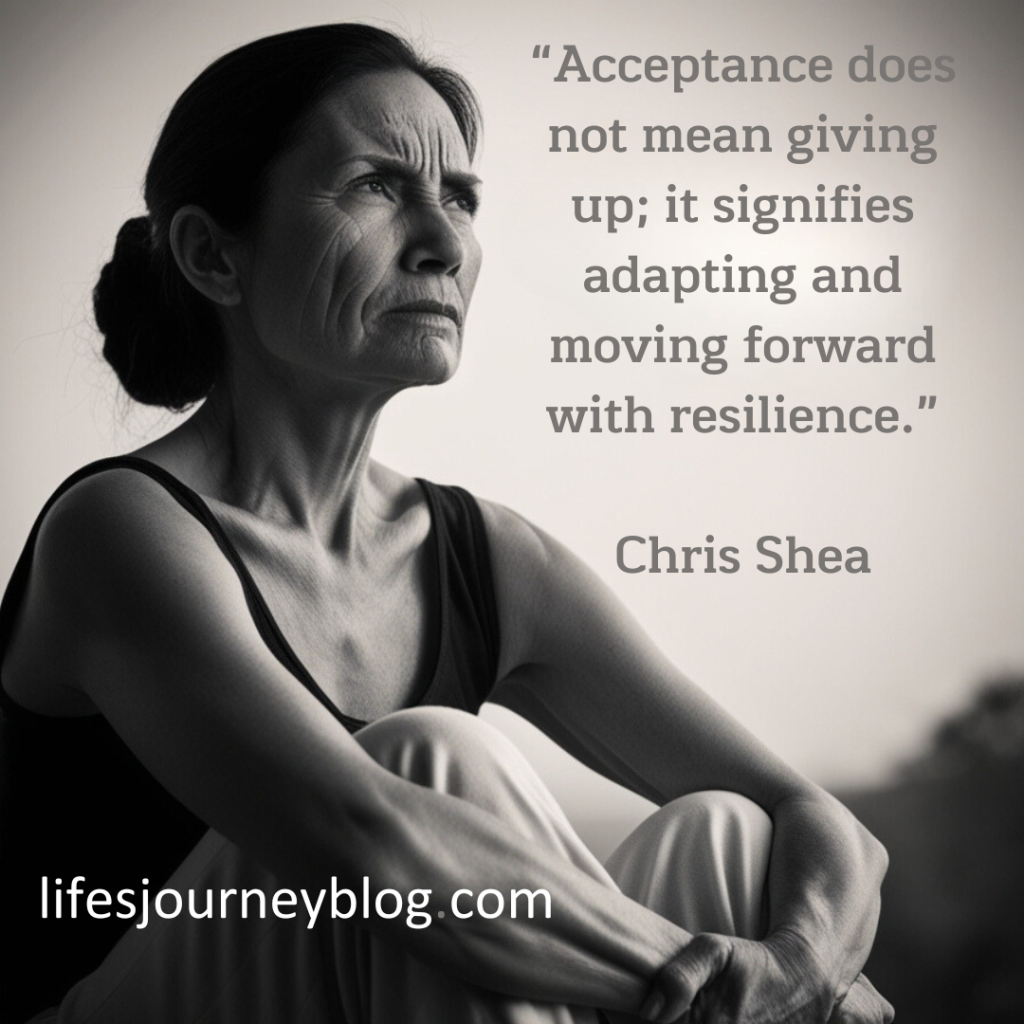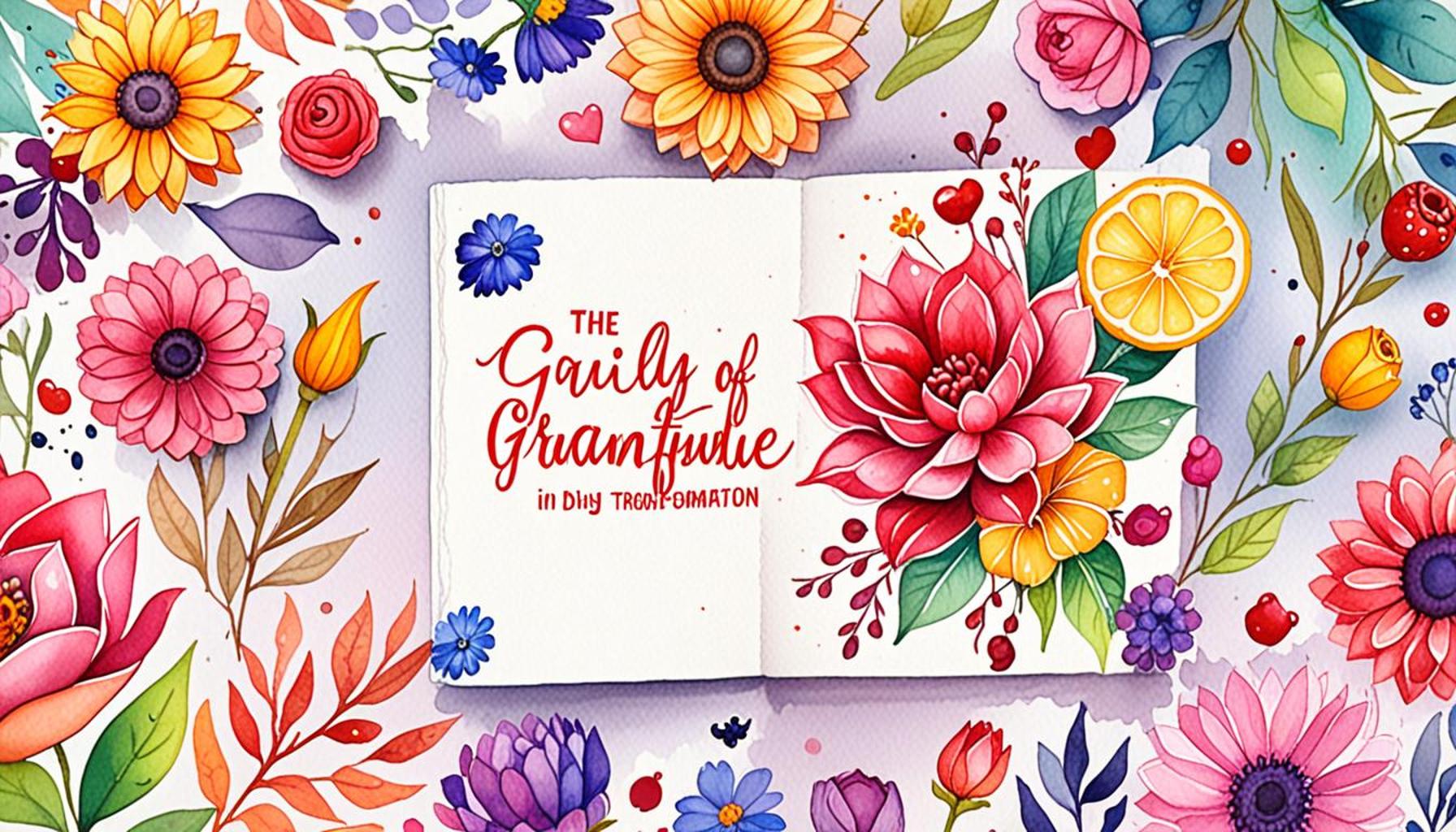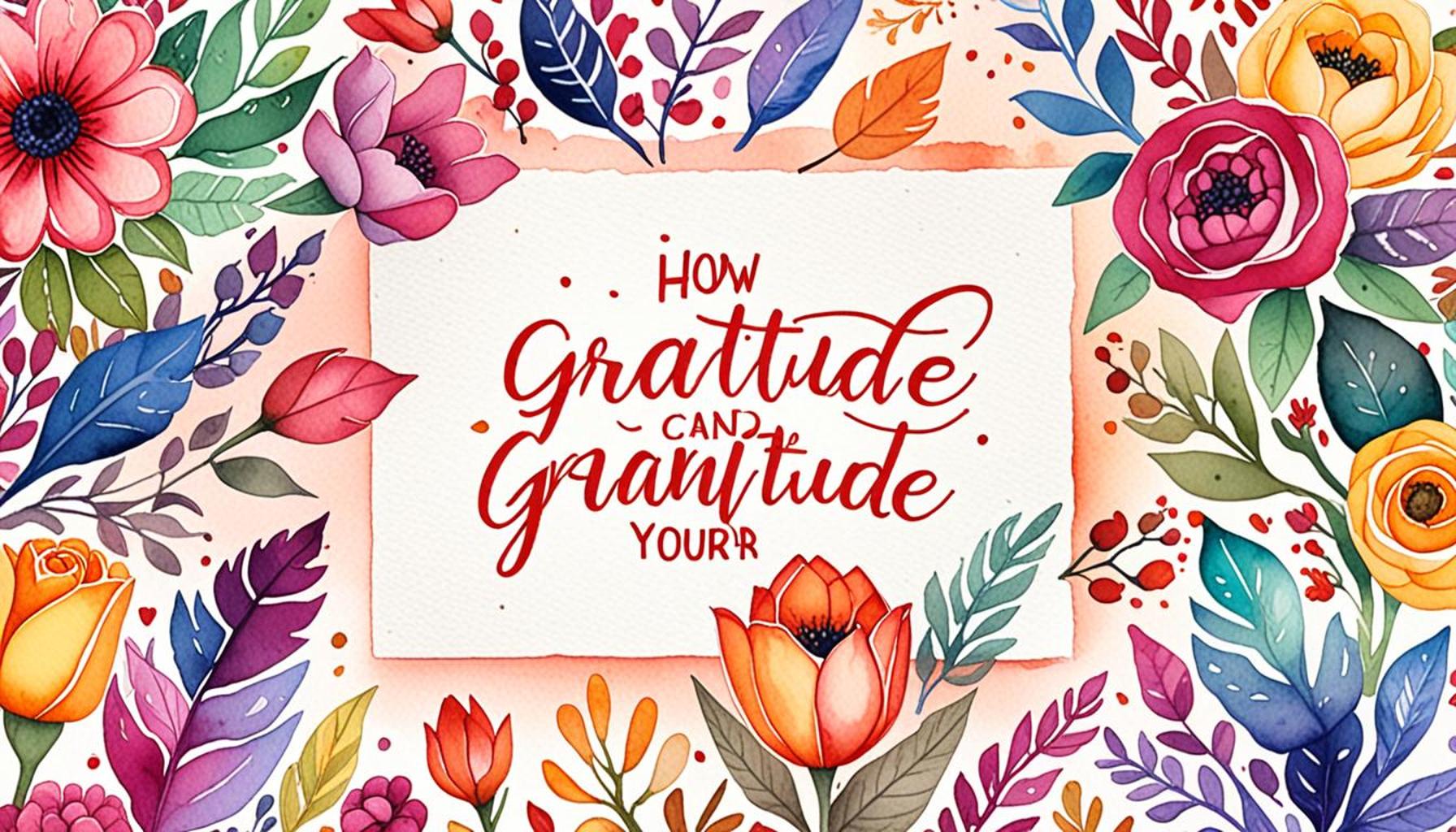Gratitude as a Spiritual Practice: Cultivating Inner Peace

The Transformative Power of Gratitude
In a world bustling with demands and distractions, discovering inner peace can feel like a daunting endeavor. Yet, one powerful practice stands out: gratitude. Embracing gratitude not only enriches our lives but also serves as a profound spiritual practice that opens doors to deeper connections and self-awareness.
Gratitude is more than a fleeting emotion; it is a transformative process marked by:
- A shift in perspective: Focusing on what we appreciate changes our outlook on life. For instance, instead of fixating on the challenges we face daily, such as financial struggles or job-related stress, recognizing the small joys—like sharing a meal with family or enjoying a beautiful sunset—can significantly alter our mental state.
- Cultivation of joy: Regular expressions of gratitude can boost happiness and contentment. Studies have shown that individuals who maintain a gratitude journal, where they jot down things they are thankful for, report higher levels of optimism and overall satisfaction with their lives.
- Strengthened relationships: Acknowledging others fosters deeper bonds and community. In Nigeria, a culture steeped in communal values, expressing gratitude not only reinforces personal relationships but also strengthens communal ties, fostering unity and cooperation among people.
In Nigeria, where community and connection hold significant cultural importance, practicing gratitude can enhance how we relate to one another. The cultural practice of “Iya ni wura,” which translates to “a mother is gold,” highlights the value placed on appreciating maternal figures and their sacrifices. By recognizing and giving thanks for the often-overlooked blessings in our lives, such as family support or the kindness of neighbors, we can cultivate inner peace amidst the chaos.
This deeper appreciation for everyday life can manifest in various ways. Consider how a simple “thank you” can completely transform a conversation or how community gatherings celebrating harvests or festivals can nurture collective gratitude and joy. These social rituals remind us of the importance of acknowledging each other’s contributions, thereby building a more supportive environment.
Incorporating gratitude into your daily routine can be achieved through simple practices. Start with a morning reflection, where you identify three things you are thankful for before beginning your day. Alternatively, engaging in communal activities—like sharing stories of gratitude during gatherings—can reinforce these connections further.

Join us in exploring the myriad ways in which gratitude can lead to a deeper sense of fulfillment and tranquility. By embracing gratitude through daily reflections or communal gatherings, the practice invites us all to experience life more fully. It beckons us to reconnect with ourselves, others, and the world around us, ultimately paving the way for lasting peace and contentment.
SEE ALSO: Click here to read another article
Embracing Gratitude in Everyday Life
The journey toward inner peace often necessitates a shift in how we engage with the world around us. Gratitude plays a pivotal role in this transformation, acting as a beacon that illuminates the often-overlooked blessings woven into the fabric of our daily existence. In Nigeria, where communal bonds are intrinsic to social dynamics, the act of embracing gratitude can foster deeper connections and create harmonious living environments.
To truly comprehend the concept of gratitude as a spiritual practice, it is essential to recognize the layers of benefits it unveils. Engaging in daily expressions of thankfulness can enhance well-being and contribute to a vibrant spiritual life. Here are several ways gratitude can manifest as a profound practice:
- Mindfulness Enhancement: Practicing gratitude demands presence and awareness. By intentionally focusing on what we are thankful for, we cultivate mindfulness, allowing us to savor each moment. Whether it’s the laughter of children playing outside or the warmth of afternoon sunlight, these small observations can ground us.
- Stress Reduction: Gratitude practices are linked to lower levels of stress and anxiety. When we consciously acknowledge positive aspects of life, we often shift our attention away from worries. This shift aids in creating mental space for tranquility and reflection, crucial for finding inner peace.
- Empathy and Forgiveness: A consistent gratitude practice cultivates empathy and can foster forgiveness. By appreciating others’ contributions and sacrifices, we are more inclined to understand diverse perspectives, building a foundation of empathy that can diffuse conflicts.
In many Nigerian communities, cultural narratives and proverbs about gratitude demonstrate its significance. For instance, the saying “A child who is not embraced by the village will burn it down to feel its warmth” underscores how acknowledging our collective efforts in raising the next generation is essential. By recognizing the role of community in our successes and struggles, we can ignite a cycle of appreciation and support that nourishes spiritual growth.
To incorporate gratitude effectively into our lives, one might experiment with dedicated practices that resonate most with their personal beliefs and routines. Simple actions such as:
- Maintaining a daily gratitude journal, where one lists three things they are thankful for,
- Participating in cultural celebrations that emphasize gratitude, such as community thanksgiving events,
- Engaging in acts of kindness, such as helping a neighbor or volunteering for local initiatives,
can be powerful catalysts for change. Each of these activities triggers a reflection process that can heighten awareness of the intrinsic value of life’s blessings.
As we delve deeper into the practice of gratitude, we begin to notice a shift not only in ourselves but also in our interactions with the surrounding world. By inviting gratefulness into our hearts and communities, we create pathways to cultivate inner peace, ultimately enriching our spiritual journey and fostering a supportive environment for all.
| Aspect of Gratitude | Impact on Inner Peace |
|---|---|
| Mindfulness Practice | Promotes presence in the moment, reducing anxiety and fostering tranquility. |
| Enhanced Relationships | Strengthens connections by encouraging appreciation and understanding among individuals. |
| Emotional Resilience | Builds capacity to cope with stress and adversity through a gratitude-focused perspective. |
| Positive Mindset | Cultivates an optimistic view of life, leading to higher levels of contentment and joy. |
The practice of gratitude significantly enhances one’s spiritual experience, creating pathways to inner peace and fulfillment. Engaging in gratitude fosters a mindfulness practice, which is crucial in calming the mind and anchoring it in the present moment. This aspect leads to reduced anxiety and a more tranquil state of being. Moreover, enhanced relationships arise from expressing gratitude, as appreciation fosters deeper connections, anchoring individuals in a supportive community.Notably, emotional resilience is a key benefit of gratitude, as acknowledging the good in one’s life strengthens coping mechanisms against stress and life’s challenges. Lastly, maintaining a positive mindset through gratitude can significantly uplift overall mental health, nurturing greater contentment and joy. Exploring these facets of gratitude can profoundly alter one’s spiritual journey, opening doors to greater peace and happiness.
RECOMMENDED: Check out this similar article
Transformative Experiences Through Gratitude
To further appreciate how gratitude operates as a spiritual practice, we must examine its potential to catalyze profound personal transformations. As individuals integrate gratitude into their daily lives, they often report experiencing a shift in perception—a newfound optimism that not only changes their internal dialogue but also positively influences their external realities.
Shift in Perspective: One of the most remarkable benefits of embracing gratitude is the transformation in how we view challenges. Instead of perceiving hardships as insurmountable obstacles, individuals who practice gratitude are more inclined to see them as opportunities for growth and learning. This shift is especially significant in a country like Nigeria, where societal pressures can often feel overwhelming. For instance, a farmer facing crop failure may learn to appreciate the lessons learned during the hardship, fostering resilience and strength through the practice of gratitude.
Moreover, recognizing the role of gratitude in our lives can lead to an appreciation of cultural heritage and traditions. In Nigerian culture, stories of resilience and triumph often emphasize the importance of gratitude and community cohesion. Celebrations such as the New Yam Festival not only honor the harvest but also provide an opportunity for community members to express collective gratitude. Engaging in such cultural traditions fosters a deeper sense of belonging and community support, reminding individuals that they are not alone in their struggles.
Strengthened Spiritual Connections: As gratitude fosters a deeper understanding of our interconnectedness, it often leads to enhanced spiritual relationships. People find themselves drawn closer to their families, friends, and communities, as the focus shifts from self-centeredness to appreciation of others. This shift creates a nurturing environment where individuals support one another in their personal and spiritual growth. Regular family gatherings centered around shared meals, for instance, as seen in many Nigerian households, can be an excellent occasion to express gratitude and strengthen familial bonds.
Gratitude in Prayer and Reflection: In many Nigerian spiritual practices, gratitude is a central theme in prayer and reflection. Whether through traditional ceremonies, church services, or personal rituals, expressing thankfulness is often stressed. Consider how communities come together in church services where songs of praise and worship intertwine messages of gratitude. This collective act not only uplifts individuals spiritually but also reinforces communal ties, creating a ripple effect that spreads positivity and inner peace throughout the community.
Furthermore, integrating gratitude into daily spiritual practices can prove transformative. Setting aside time for meditation that focuses on thankfulness can deepen one’s spiritual experience. Many find that reflecting on what they are grateful for before meditation enhances their capacity to connect with their spirituality and fosters a sense of calm and peace within. This tranquil state becomes a sanctuary that individuals can return to in times of stress, reinforcing the importance of gratitude as a sustainable practice for cultivating inner serenity.
As one continues to explore the multifaceted nature of gratitude, it becomes increasingly clear that the practice holds the power to facilitate profound personal and communal transformations. Within the vibrant cultural landscape of Nigeria, investing in gratitude not only nurtures personal growth but also paves the way for a more harmonious, enriching spiritual journey for everyone involved.
CHECK OUT: Click here to explore more
Conclusion: Embracing Gratitude for Lasting Inner Peace
In conclusion, the practice of gratitude stands as a powerful tool for cultivating inner peace and fostering a deeper spiritual connection within ourselves and our communities. By shifting our perspectives from viewing challenges as burdens to recognizing them as opportunities for growth, we not only enhance our resilience but also enrich our lives with a sense of purpose and appreciation. In the vibrant cultural context of Nigeria, where communal ties are strong and traditions are cherished, gratitude serves as a thread that weaves together the fabric of our societal relationships.
The transformative nature of gratitude is evident in both personal and collective experiences. As individuals engage in practices that express thankfulness—whether through prayer, communal gatherings, or individual reflection—they begin to cultivate a sense of belonging that transcends individual struggles. This shared appreciation encourages an environment of support, resilience, and harmony, paving the way for personal and communal growth.
Moreover, as Nigeria continues to navigate various societal challenges, the persistent integration of gratitude into daily life can inspire a culture of hope and positivity. By elevating gratitude from a mere emotional response to a deliberate spiritual practice, we open the doors for lasting transformations that contribute not only to our own peace of mind but also to the wellbeing of those around us.
As we embrace gratitude as an essential part of our spiritual journeys, we invite deeper connections, enriched relationships, and ultimately, a more peaceful existence. The path to inner peace is illuminated by the light of thankfulness—an age-old practice that remains profoundly relevant in today’s fast-paced world.


